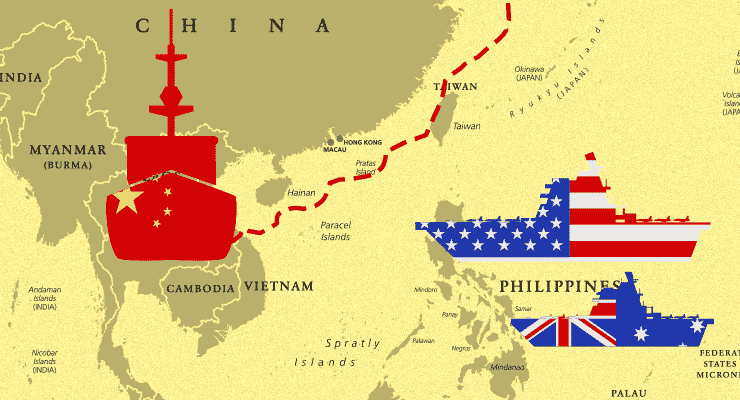
As more dangerous interactions between Australian and Chinese military forces occur in the South China Sea, it’s important to explore what the legal basis is for Australia’s activities — and what neither the government nor the media reveal about them.
Defence Minister Richard Marles says Australia is acting in accordance with international law when conducting naval and aviation activities in China’s exclusive economic zone (EEZ). Just so — there is no doubt that EEZs around the world are international waters.
EEZs encompass waters extending up to 200 nautical miles (approximately 340 kilometres) from a country’s shores. Under the 1982 United Nations Convention on the Law of the Sea, a coastal state has the right to regulate economic activities (such as fishing and oil exploration) within its EEZ. China has ratified the convention, established its own EEZ, and also recognises those of other states.
But the United States has not ratified the convention — the only major maritime power to not do so. However, it says it will act in accordance with its provisions. And it established its EEZ within 200 nautical miles of its coast and also recognises the EEZ of other states.
But it also says it has the right to conduct military and intelligence-collection activities within any country’s EEZ. China disagrees. It says it respects freedom of navigation in the South China Sea, but does not respect the right of foreign governments to conduct military and intelligence-collection activities within its EEZ.
More to the point, the three major regional maritime powers friendly to Australia — India, Indonesia and the Philippines — agree with China.
For example, in April last year, the US 7th Fleet carried out a freedom-of-navigation operation in the EEZ of Quad partner India. India objected, saying the convention “does not authorise other states to carry out in the EEZ and on the continental shelf, military exercises or manoeuvres, in particular those involving the use of weapons or explosives, without the consent of the coastal state”.
So what benefit do we get from upholding the US approach to EEZs, especially given the potential to upset key regional powers we want on our side? An expert from the US Naval War College who testified before Congress in 2009, said if it accepted the position of China, India, the Philippines and Indonesia on EEZs, the US would be forced to conduct military operations from more than 200 miles offshore.
That would significantly reduce the range of US sensors and missiles, making intelligence-gathering much harder and making it much more difficult to deploy US marines and their equipment in amphibious assaults. America’s ability to project naval and air power would face limitations not only in the South China Sea but also in other EEZs such as the Persian Gulf. Its ability to use the world’s oceans as a medium of manoeuvre and global power projection would be threatened.
This approach has consequences. China has begun to conduct intelligence-gathering and presence operations in other countries’ EEZs, including Australia’s, justifying its behaviour by saying that it would not do so if Australia adopted its own position on the sovereignty of EEZs. Australia can have no complaint if China adopts the very behaviour we’re engaging in.
The real nature of the dispute over EEZs is rarely, if ever, made clear by the Australian government. The presence of Australian vessels and aircraft in the South China Sea is always explained in vague terms as about “freedom of navigation”, without saying what that actually involves — dropping sonobuoys to identify Chinese submarines and ships in order to destroy them at the start of hostilities. Instead, Australian vessels and aircraft are portrayed as innocently exercising their rights under
international law in the face of a belligerent power.
Australian media rarely deviate from the government line. In foreign media, however, it is relatively normal to note that there is a fundamental dispute between the US and China over what conduct is permissible in EEZs.
Australians deserve to be told what the objective is: to uphold America’s desire to project power in every EEZ in the world, not just the South China Sea. Otherwise they will continue to be misled if or when a clash occurs.









What has changed since we prostrated ourselves before the Great White Fleet in 1908? We were an imperial outpost then and we are an imperial outpost now. Of course the media, the security establishment, the foreign affairs elite, and their parliamentary poodles don’t mention this. They don’t need to mention it. It goes without saying.
Thanks for the explanation, which as you say is rarely, if ever, published to plebs like us. It certainly reveals at least part of the reason China has the sh*ts with us and the US. It also explains what many consider it provocative. And it makes clear that Mr Potato Head, now leader of the opposition, is a blatant hypocrite for the disgraceful song and dance he made a about a Chinese navel ship miles off the WA coast during the later stages of the election campaign
Given the approach that military and intelligence operations are no allowed within an EEZ, that would there exclude a right of navigation for any naval vessel within an EEZ because these ships are absolutely loaded with communications and intelligence gathering equipment, software and systems; ie unless the vessel is invited to sail in the EEZ.
Can’t be too hard on our poor SpudHead. Hard to condemn someone with an IQ lower tan 50.
He shall be Spud Dutton henceforth.
aka Untergrabenkartoffelkopf.
The mass media with monopoly control has become much more powerful. Even Auntie has succumbed to the political pressure of the government. A great article. Thank you Bernard and Crikey.
Albo needs to get his finger out and clear out th eboard of Auntie ASAP.
Bit OT, but have an upvote anyway.
Australians are never told exactly where their military platform was nor why it was there during these cases. That alone tells us something. The Chinese know where it was, the USA knows, Defence know, but the people paying for the expensive platforms and on whose behalf they allegedly operate are kept in ignorance.
S.O.P.
Gotta lurve democratic accountability due to a vigorous press – anyone know where either may be found?
Everyone spies on everyone else to the maximum of their ability to do so. Australia is spied on by the USA far more than by anyone else. Industrial, military, societal. Your only secret is who you voted for, and they can probably work that out too. Intel from ocean going vessels is a miniscule part of the whole. The USA relies on Australia for their security, or at least their perceived security, whereas we perceive that we rely on them for our security – even though China can bring us to our knees simply by not selling us anything. So it might be said that we rely on China for our security. Bring your own reality to the argument, as in everything.
The biggest threat to your and my security is anything that puts methane or CO2 into the atmosphere, and that is a fact you can take to the bank.